Anglia Ruskin University: Memorization's Impact on EFL Speaking
VerifiedAdded on 2023/04/20
|8
|2584
|299
Essay
AI Summary
This essay explores the role of memorization in motivating English as a Foreign Language (EFL) learners to speak. It argues that while memorization is an inevitable part of language learning, providing a foundation in vocabulary, grammar, and nuances, it also has its drawbacks. The essay presents arguments both for and against memorization, highlighting its potential to build confidence and accuracy in language delivery, while also acknowledging concerns about demotivation and a lack of practical application. Ultimately, the essay concludes that memorization is a crucial initial step in mastering English, enabling learners to deliver the language with greater fluency and accuracy, while also encouraging them to improve further. The essay references various studies and examples to support its claims, considering the pedagogical approaches and motivational factors involved in EFL learning.
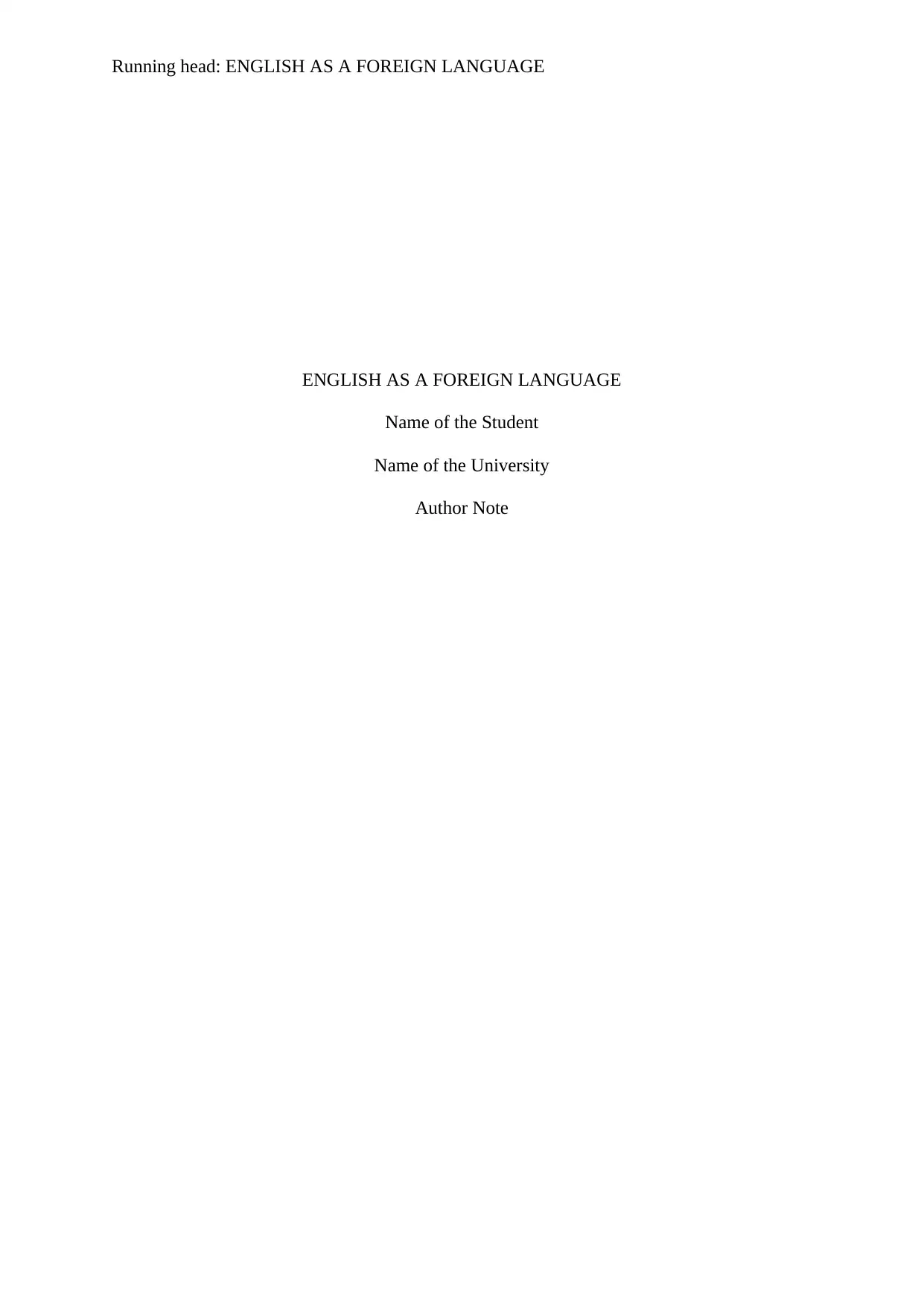
Running head: ENGLISH AS A FOREIGN LANGUAGE
ENGLISH AS A FOREIGN LANGUAGE
Name of the Student
Name of the University
Author Note
ENGLISH AS A FOREIGN LANGUAGE
Name of the Student
Name of the University
Author Note
Paraphrase This Document
Need a fresh take? Get an instant paraphrase of this document with our AI Paraphraser
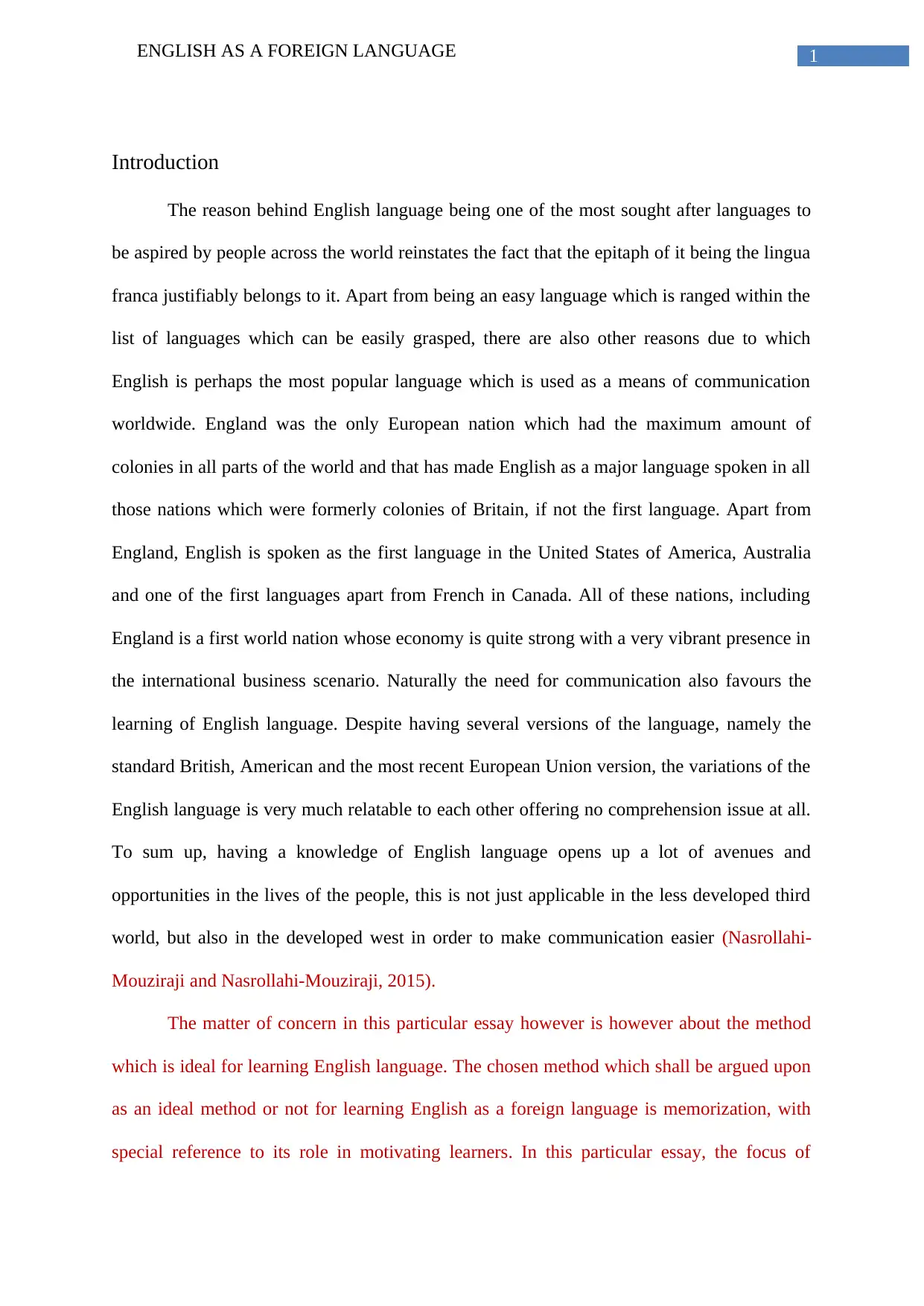
1ENGLISH AS A FOREIGN LANGUAGE
Introduction
The reason behind English language being one of the most sought after languages to
be aspired by people across the world reinstates the fact that the epitaph of it being the lingua
franca justifiably belongs to it. Apart from being an easy language which is ranged within the
list of languages which can be easily grasped, there are also other reasons due to which
English is perhaps the most popular language which is used as a means of communication
worldwide. England was the only European nation which had the maximum amount of
colonies in all parts of the world and that has made English as a major language spoken in all
those nations which were formerly colonies of Britain, if not the first language. Apart from
England, English is spoken as the first language in the United States of America, Australia
and one of the first languages apart from French in Canada. All of these nations, including
England is a first world nation whose economy is quite strong with a very vibrant presence in
the international business scenario. Naturally the need for communication also favours the
learning of English language. Despite having several versions of the language, namely the
standard British, American and the most recent European Union version, the variations of the
English language is very much relatable to each other offering no comprehension issue at all.
To sum up, having a knowledge of English language opens up a lot of avenues and
opportunities in the lives of the people, this is not just applicable in the less developed third
world, but also in the developed west in order to make communication easier (Nasrollahi-
Mouziraji and Nasrollahi-Mouziraji, 2015).
The matter of concern in this particular essay however is however about the method
which is ideal for learning English language. The chosen method which shall be argued upon
as an ideal method or not for learning English as a foreign language is memorization, with
special reference to its role in motivating learners. In this particular essay, the focus of
Introduction
The reason behind English language being one of the most sought after languages to
be aspired by people across the world reinstates the fact that the epitaph of it being the lingua
franca justifiably belongs to it. Apart from being an easy language which is ranged within the
list of languages which can be easily grasped, there are also other reasons due to which
English is perhaps the most popular language which is used as a means of communication
worldwide. England was the only European nation which had the maximum amount of
colonies in all parts of the world and that has made English as a major language spoken in all
those nations which were formerly colonies of Britain, if not the first language. Apart from
England, English is spoken as the first language in the United States of America, Australia
and one of the first languages apart from French in Canada. All of these nations, including
England is a first world nation whose economy is quite strong with a very vibrant presence in
the international business scenario. Naturally the need for communication also favours the
learning of English language. Despite having several versions of the language, namely the
standard British, American and the most recent European Union version, the variations of the
English language is very much relatable to each other offering no comprehension issue at all.
To sum up, having a knowledge of English language opens up a lot of avenues and
opportunities in the lives of the people, this is not just applicable in the less developed third
world, but also in the developed west in order to make communication easier (Nasrollahi-
Mouziraji and Nasrollahi-Mouziraji, 2015).
The matter of concern in this particular essay however is however about the method
which is ideal for learning English language. The chosen method which shall be argued upon
as an ideal method or not for learning English as a foreign language is memorization, with
special reference to its role in motivating learners. In this particular essay, the focus of
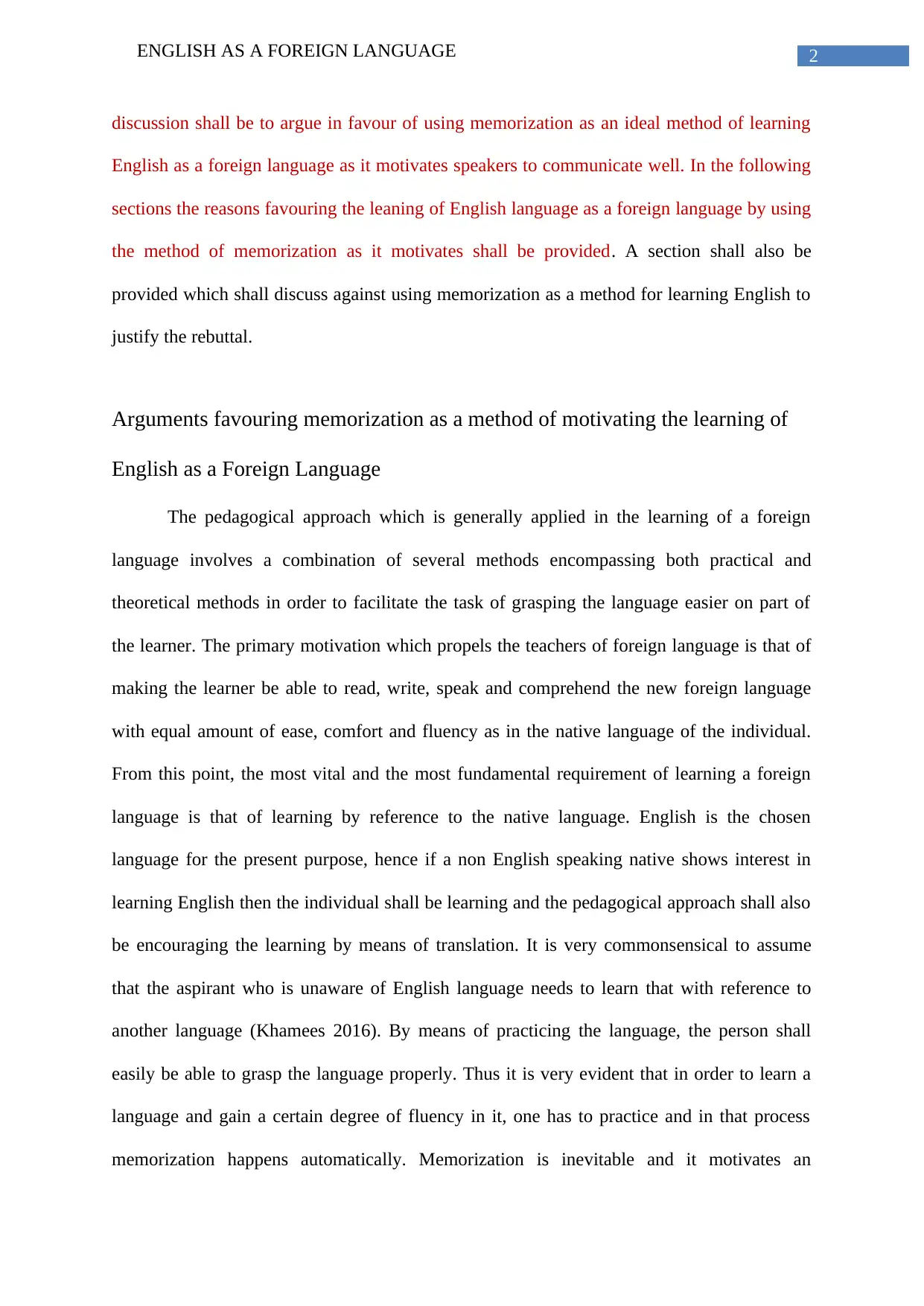
2ENGLISH AS A FOREIGN LANGUAGE
discussion shall be to argue in favour of using memorization as an ideal method of learning
English as a foreign language as it motivates speakers to communicate well. In the following
sections the reasons favouring the leaning of English language as a foreign language by using
the method of memorization as it motivates shall be provided. A section shall also be
provided which shall discuss against using memorization as a method for learning English to
justify the rebuttal.
Arguments favouring memorization as a method of motivating the learning of
English as a Foreign Language
The pedagogical approach which is generally applied in the learning of a foreign
language involves a combination of several methods encompassing both practical and
theoretical methods in order to facilitate the task of grasping the language easier on part of
the learner. The primary motivation which propels the teachers of foreign language is that of
making the learner be able to read, write, speak and comprehend the new foreign language
with equal amount of ease, comfort and fluency as in the native language of the individual.
From this point, the most vital and the most fundamental requirement of learning a foreign
language is that of learning by reference to the native language. English is the chosen
language for the present purpose, hence if a non English speaking native shows interest in
learning English then the individual shall be learning and the pedagogical approach shall also
be encouraging the learning by means of translation. It is very commonsensical to assume
that the aspirant who is unaware of English language needs to learn that with reference to
another language (Khamees 2016). By means of practicing the language, the person shall
easily be able to grasp the language properly. Thus it is very evident that in order to learn a
language and gain a certain degree of fluency in it, one has to practice and in that process
memorization happens automatically. Memorization is inevitable and it motivates an
discussion shall be to argue in favour of using memorization as an ideal method of learning
English as a foreign language as it motivates speakers to communicate well. In the following
sections the reasons favouring the leaning of English language as a foreign language by using
the method of memorization as it motivates shall be provided. A section shall also be
provided which shall discuss against using memorization as a method for learning English to
justify the rebuttal.
Arguments favouring memorization as a method of motivating the learning of
English as a Foreign Language
The pedagogical approach which is generally applied in the learning of a foreign
language involves a combination of several methods encompassing both practical and
theoretical methods in order to facilitate the task of grasping the language easier on part of
the learner. The primary motivation which propels the teachers of foreign language is that of
making the learner be able to read, write, speak and comprehend the new foreign language
with equal amount of ease, comfort and fluency as in the native language of the individual.
From this point, the most vital and the most fundamental requirement of learning a foreign
language is that of learning by reference to the native language. English is the chosen
language for the present purpose, hence if a non English speaking native shows interest in
learning English then the individual shall be learning and the pedagogical approach shall also
be encouraging the learning by means of translation. It is very commonsensical to assume
that the aspirant who is unaware of English language needs to learn that with reference to
another language (Khamees 2016). By means of practicing the language, the person shall
easily be able to grasp the language properly. Thus it is very evident that in order to learn a
language and gain a certain degree of fluency in it, one has to practice and in that process
memorization happens automatically. Memorization is inevitable and it motivates an
⊘ This is a preview!⊘
Do you want full access?
Subscribe today to unlock all pages.

Trusted by 1+ million students worldwide
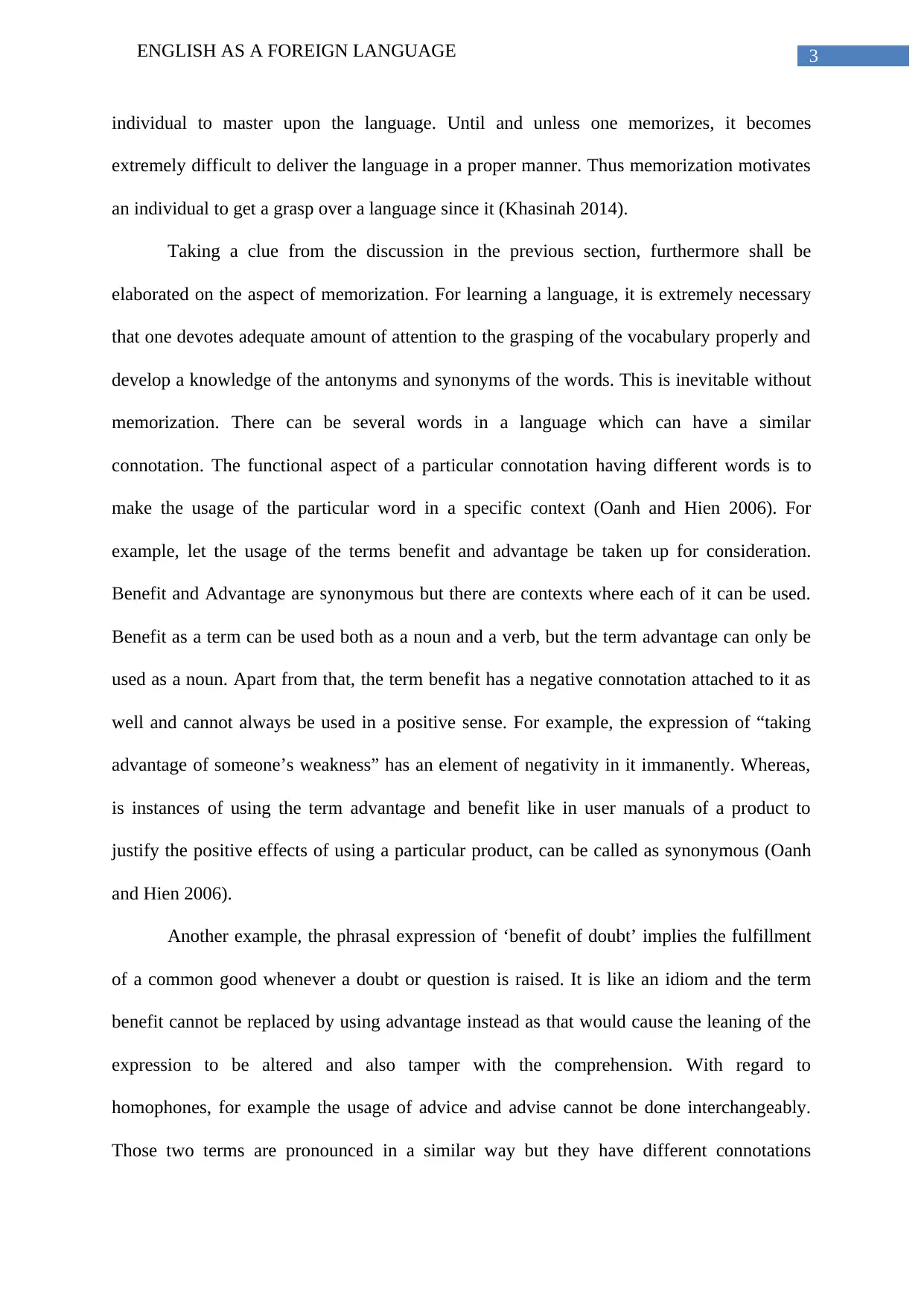
3ENGLISH AS A FOREIGN LANGUAGE
individual to master upon the language. Until and unless one memorizes, it becomes
extremely difficult to deliver the language in a proper manner. Thus memorization motivates
an individual to get a grasp over a language since it (Khasinah 2014).
Taking a clue from the discussion in the previous section, furthermore shall be
elaborated on the aspect of memorization. For learning a language, it is extremely necessary
that one devotes adequate amount of attention to the grasping of the vocabulary properly and
develop a knowledge of the antonyms and synonyms of the words. This is inevitable without
memorization. There can be several words in a language which can have a similar
connotation. The functional aspect of a particular connotation having different words is to
make the usage of the particular word in a specific context (Oanh and Hien 2006). For
example, let the usage of the terms benefit and advantage be taken up for consideration.
Benefit and Advantage are synonymous but there are contexts where each of it can be used.
Benefit as a term can be used both as a noun and a verb, but the term advantage can only be
used as a noun. Apart from that, the term benefit has a negative connotation attached to it as
well and cannot always be used in a positive sense. For example, the expression of “taking
advantage of someone’s weakness” has an element of negativity in it immanently. Whereas,
is instances of using the term advantage and benefit like in user manuals of a product to
justify the positive effects of using a particular product, can be called as synonymous (Oanh
and Hien 2006).
Another example, the phrasal expression of ‘benefit of doubt’ implies the fulfillment
of a common good whenever a doubt or question is raised. It is like an idiom and the term
benefit cannot be replaced by using advantage instead as that would cause the leaning of the
expression to be altered and also tamper with the comprehension. With regard to
homophones, for example the usage of advice and advise cannot be done interchangeably.
Those two terms are pronounced in a similar way but they have different connotations
individual to master upon the language. Until and unless one memorizes, it becomes
extremely difficult to deliver the language in a proper manner. Thus memorization motivates
an individual to get a grasp over a language since it (Khasinah 2014).
Taking a clue from the discussion in the previous section, furthermore shall be
elaborated on the aspect of memorization. For learning a language, it is extremely necessary
that one devotes adequate amount of attention to the grasping of the vocabulary properly and
develop a knowledge of the antonyms and synonyms of the words. This is inevitable without
memorization. There can be several words in a language which can have a similar
connotation. The functional aspect of a particular connotation having different words is to
make the usage of the particular word in a specific context (Oanh and Hien 2006). For
example, let the usage of the terms benefit and advantage be taken up for consideration.
Benefit and Advantage are synonymous but there are contexts where each of it can be used.
Benefit as a term can be used both as a noun and a verb, but the term advantage can only be
used as a noun. Apart from that, the term benefit has a negative connotation attached to it as
well and cannot always be used in a positive sense. For example, the expression of “taking
advantage of someone’s weakness” has an element of negativity in it immanently. Whereas,
is instances of using the term advantage and benefit like in user manuals of a product to
justify the positive effects of using a particular product, can be called as synonymous (Oanh
and Hien 2006).
Another example, the phrasal expression of ‘benefit of doubt’ implies the fulfillment
of a common good whenever a doubt or question is raised. It is like an idiom and the term
benefit cannot be replaced by using advantage instead as that would cause the leaning of the
expression to be altered and also tamper with the comprehension. With regard to
homophones, for example the usage of advice and advise cannot be done interchangeably.
Those two terms are pronounced in a similar way but they have different connotations
Paraphrase This Document
Need a fresh take? Get an instant paraphrase of this document with our AI Paraphraser
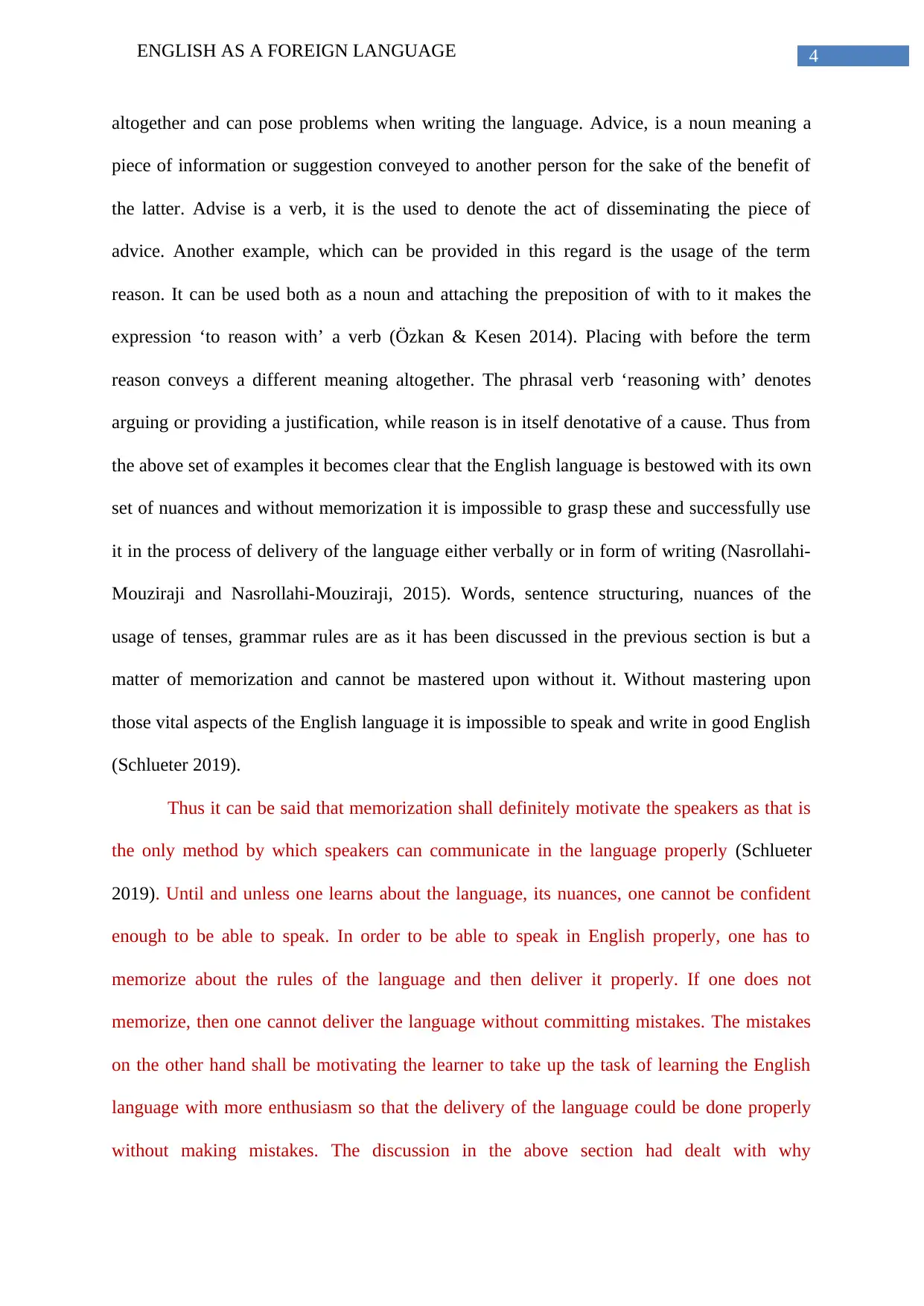
4ENGLISH AS A FOREIGN LANGUAGE
altogether and can pose problems when writing the language. Advice, is a noun meaning a
piece of information or suggestion conveyed to another person for the sake of the benefit of
the latter. Advise is a verb, it is the used to denote the act of disseminating the piece of
advice. Another example, which can be provided in this regard is the usage of the term
reason. It can be used both as a noun and attaching the preposition of with to it makes the
expression ‘to reason with’ a verb (Özkan & Kesen 2014). Placing with before the term
reason conveys a different meaning altogether. The phrasal verb ‘reasoning with’ denotes
arguing or providing a justification, while reason is in itself denotative of a cause. Thus from
the above set of examples it becomes clear that the English language is bestowed with its own
set of nuances and without memorization it is impossible to grasp these and successfully use
it in the process of delivery of the language either verbally or in form of writing (Nasrollahi-
Mouziraji and Nasrollahi-Mouziraji, 2015). Words, sentence structuring, nuances of the
usage of tenses, grammar rules are as it has been discussed in the previous section is but a
matter of memorization and cannot be mastered upon without it. Without mastering upon
those vital aspects of the English language it is impossible to speak and write in good English
(Schlueter 2019).
Thus it can be said that memorization shall definitely motivate the speakers as that is
the only method by which speakers can communicate in the language properly (Schlueter
2019). Until and unless one learns about the language, its nuances, one cannot be confident
enough to be able to speak. In order to be able to speak in English properly, one has to
memorize about the rules of the language and then deliver it properly. If one does not
memorize, then one cannot deliver the language without committing mistakes. The mistakes
on the other hand shall be motivating the learner to take up the task of learning the English
language with more enthusiasm so that the delivery of the language could be done properly
without making mistakes. The discussion in the above section had dealt with why
altogether and can pose problems when writing the language. Advice, is a noun meaning a
piece of information or suggestion conveyed to another person for the sake of the benefit of
the latter. Advise is a verb, it is the used to denote the act of disseminating the piece of
advice. Another example, which can be provided in this regard is the usage of the term
reason. It can be used both as a noun and attaching the preposition of with to it makes the
expression ‘to reason with’ a verb (Özkan & Kesen 2014). Placing with before the term
reason conveys a different meaning altogether. The phrasal verb ‘reasoning with’ denotes
arguing or providing a justification, while reason is in itself denotative of a cause. Thus from
the above set of examples it becomes clear that the English language is bestowed with its own
set of nuances and without memorization it is impossible to grasp these and successfully use
it in the process of delivery of the language either verbally or in form of writing (Nasrollahi-
Mouziraji and Nasrollahi-Mouziraji, 2015). Words, sentence structuring, nuances of the
usage of tenses, grammar rules are as it has been discussed in the previous section is but a
matter of memorization and cannot be mastered upon without it. Without mastering upon
those vital aspects of the English language it is impossible to speak and write in good English
(Schlueter 2019).
Thus it can be said that memorization shall definitely motivate the speakers as that is
the only method by which speakers can communicate in the language properly (Schlueter
2019). Until and unless one learns about the language, its nuances, one cannot be confident
enough to be able to speak. In order to be able to speak in English properly, one has to
memorize about the rules of the language and then deliver it properly. If one does not
memorize, then one cannot deliver the language without committing mistakes. The mistakes
on the other hand shall be motivating the learner to take up the task of learning the English
language with more enthusiasm so that the delivery of the language could be done properly
without making mistakes. The discussion in the above section had dealt with why
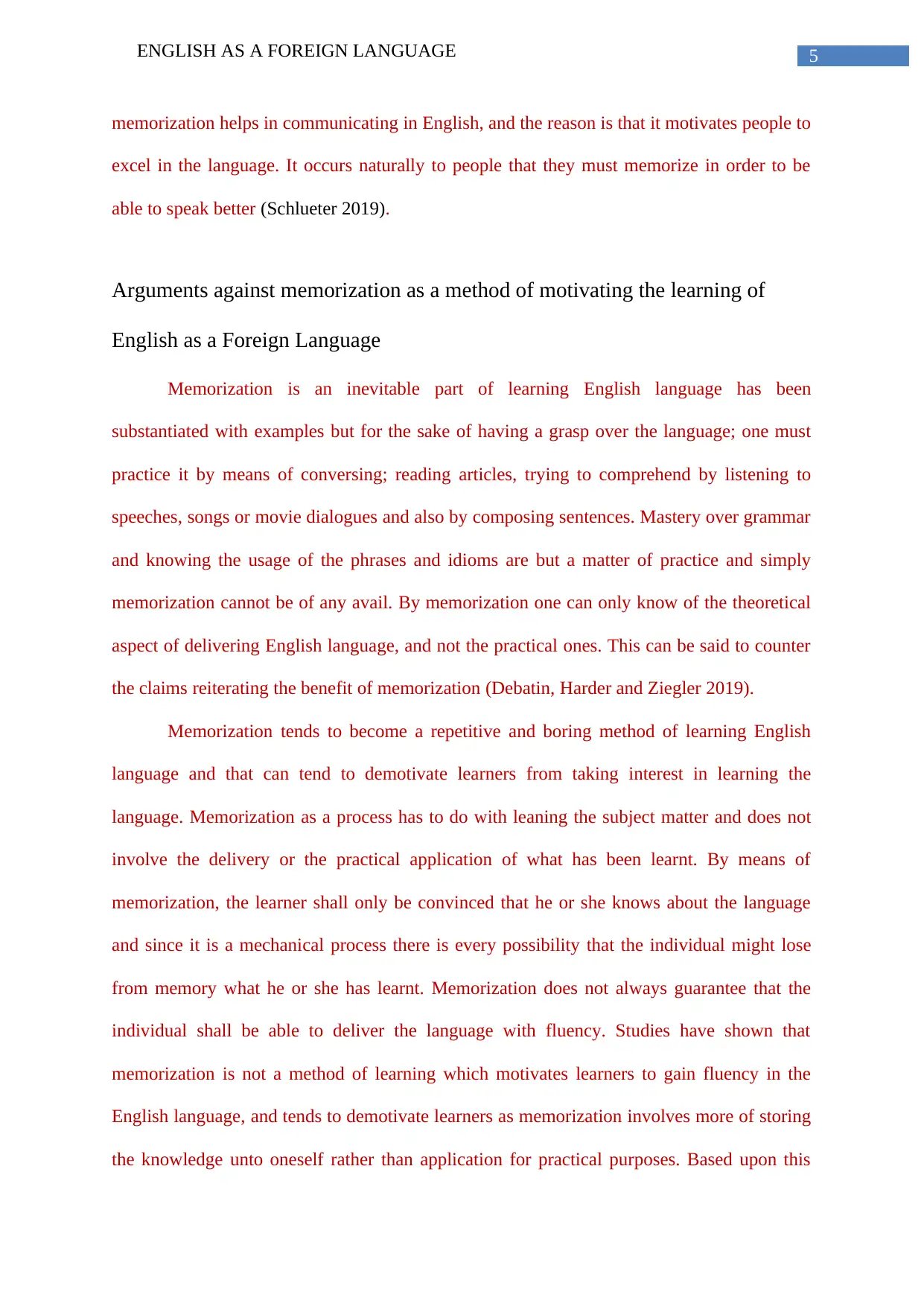
5ENGLISH AS A FOREIGN LANGUAGE
memorization helps in communicating in English, and the reason is that it motivates people to
excel in the language. It occurs naturally to people that they must memorize in order to be
able to speak better (Schlueter 2019).
Arguments against memorization as a method of motivating the learning of
English as a Foreign Language
Memorization is an inevitable part of learning English language has been
substantiated with examples but for the sake of having a grasp over the language; one must
practice it by means of conversing; reading articles, trying to comprehend by listening to
speeches, songs or movie dialogues and also by composing sentences. Mastery over grammar
and knowing the usage of the phrases and idioms are but a matter of practice and simply
memorization cannot be of any avail. By memorization one can only know of the theoretical
aspect of delivering English language, and not the practical ones. This can be said to counter
the claims reiterating the benefit of memorization (Debatin, Harder and Ziegler 2019).
Memorization tends to become a repetitive and boring method of learning English
language and that can tend to demotivate learners from taking interest in learning the
language. Memorization as a process has to do with leaning the subject matter and does not
involve the delivery or the practical application of what has been learnt. By means of
memorization, the learner shall only be convinced that he or she knows about the language
and since it is a mechanical process there is every possibility that the individual might lose
from memory what he or she has learnt. Memorization does not always guarantee that the
individual shall be able to deliver the language with fluency. Studies have shown that
memorization is not a method of learning which motivates learners to gain fluency in the
English language, and tends to demotivate learners as memorization involves more of storing
the knowledge unto oneself rather than application for practical purposes. Based upon this
memorization helps in communicating in English, and the reason is that it motivates people to
excel in the language. It occurs naturally to people that they must memorize in order to be
able to speak better (Schlueter 2019).
Arguments against memorization as a method of motivating the learning of
English as a Foreign Language
Memorization is an inevitable part of learning English language has been
substantiated with examples but for the sake of having a grasp over the language; one must
practice it by means of conversing; reading articles, trying to comprehend by listening to
speeches, songs or movie dialogues and also by composing sentences. Mastery over grammar
and knowing the usage of the phrases and idioms are but a matter of practice and simply
memorization cannot be of any avail. By memorization one can only know of the theoretical
aspect of delivering English language, and not the practical ones. This can be said to counter
the claims reiterating the benefit of memorization (Debatin, Harder and Ziegler 2019).
Memorization tends to become a repetitive and boring method of learning English
language and that can tend to demotivate learners from taking interest in learning the
language. Memorization as a process has to do with leaning the subject matter and does not
involve the delivery or the practical application of what has been learnt. By means of
memorization, the learner shall only be convinced that he or she knows about the language
and since it is a mechanical process there is every possibility that the individual might lose
from memory what he or she has learnt. Memorization does not always guarantee that the
individual shall be able to deliver the language with fluency. Studies have shown that
memorization is not a method of learning which motivates learners to gain fluency in the
English language, and tends to demotivate learners as memorization involves more of storing
the knowledge unto oneself rather than application for practical purposes. Based upon this
⊘ This is a preview!⊘
Do you want full access?
Subscribe today to unlock all pages.

Trusted by 1+ million students worldwide
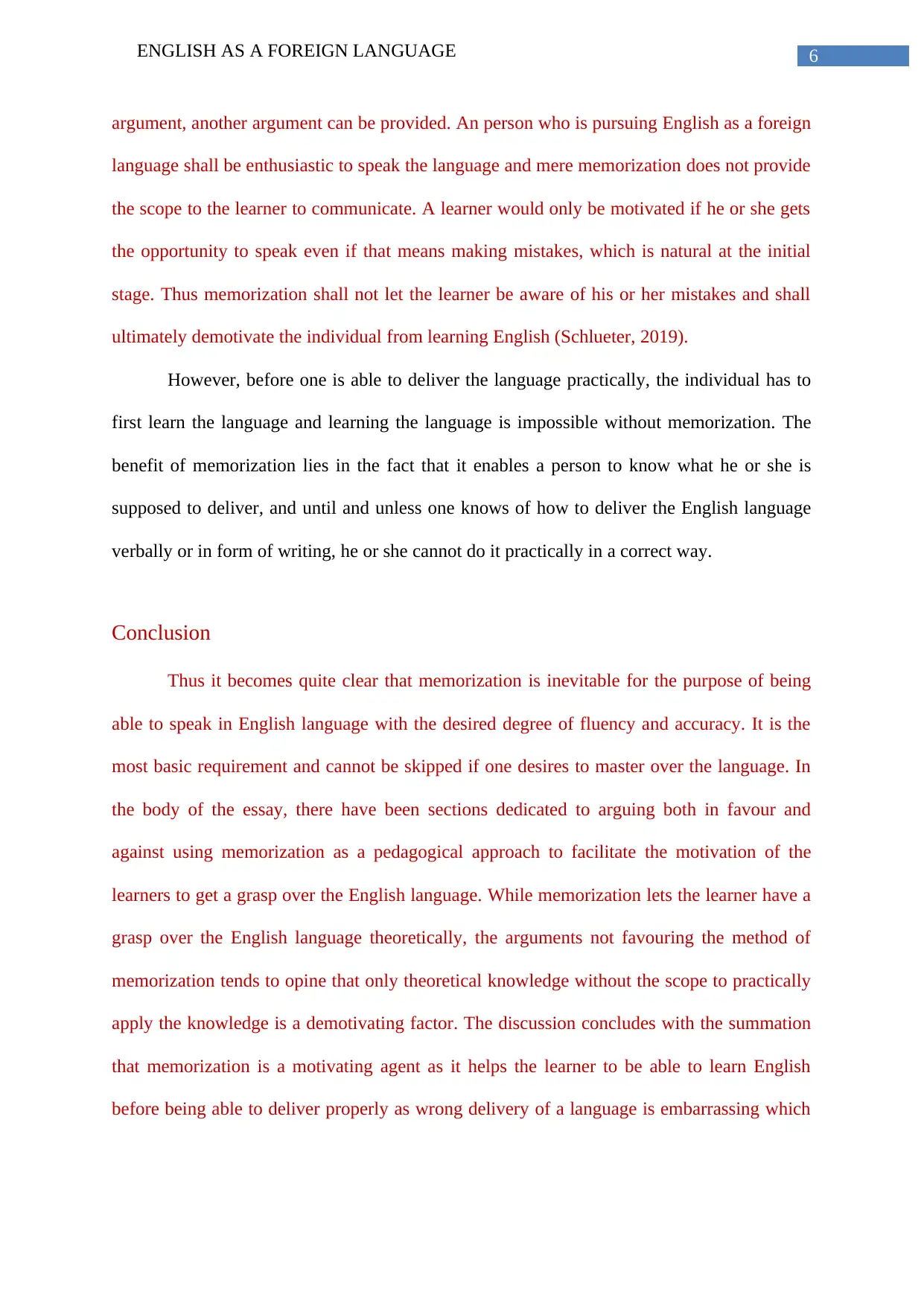
6ENGLISH AS A FOREIGN LANGUAGE
argument, another argument can be provided. An person who is pursuing English as a foreign
language shall be enthusiastic to speak the language and mere memorization does not provide
the scope to the learner to communicate. A learner would only be motivated if he or she gets
the opportunity to speak even if that means making mistakes, which is natural at the initial
stage. Thus memorization shall not let the learner be aware of his or her mistakes and shall
ultimately demotivate the individual from learning English (Schlueter, 2019).
However, before one is able to deliver the language practically, the individual has to
first learn the language and learning the language is impossible without memorization. The
benefit of memorization lies in the fact that it enables a person to know what he or she is
supposed to deliver, and until and unless one knows of how to deliver the English language
verbally or in form of writing, he or she cannot do it practically in a correct way.
Conclusion
Thus it becomes quite clear that memorization is inevitable for the purpose of being
able to speak in English language with the desired degree of fluency and accuracy. It is the
most basic requirement and cannot be skipped if one desires to master over the language. In
the body of the essay, there have been sections dedicated to arguing both in favour and
against using memorization as a pedagogical approach to facilitate the motivation of the
learners to get a grasp over the English language. While memorization lets the learner have a
grasp over the English language theoretically, the arguments not favouring the method of
memorization tends to opine that only theoretical knowledge without the scope to practically
apply the knowledge is a demotivating factor. The discussion concludes with the summation
that memorization is a motivating agent as it helps the learner to be able to learn English
before being able to deliver properly as wrong delivery of a language is embarrassing which
argument, another argument can be provided. An person who is pursuing English as a foreign
language shall be enthusiastic to speak the language and mere memorization does not provide
the scope to the learner to communicate. A learner would only be motivated if he or she gets
the opportunity to speak even if that means making mistakes, which is natural at the initial
stage. Thus memorization shall not let the learner be aware of his or her mistakes and shall
ultimately demotivate the individual from learning English (Schlueter, 2019).
However, before one is able to deliver the language practically, the individual has to
first learn the language and learning the language is impossible without memorization. The
benefit of memorization lies in the fact that it enables a person to know what he or she is
supposed to deliver, and until and unless one knows of how to deliver the English language
verbally or in form of writing, he or she cannot do it practically in a correct way.
Conclusion
Thus it becomes quite clear that memorization is inevitable for the purpose of being
able to speak in English language with the desired degree of fluency and accuracy. It is the
most basic requirement and cannot be skipped if one desires to master over the language. In
the body of the essay, there have been sections dedicated to arguing both in favour and
against using memorization as a pedagogical approach to facilitate the motivation of the
learners to get a grasp over the English language. While memorization lets the learner have a
grasp over the English language theoretically, the arguments not favouring the method of
memorization tends to opine that only theoretical knowledge without the scope to practically
apply the knowledge is a demotivating factor. The discussion concludes with the summation
that memorization is a motivating agent as it helps the learner to be able to learn English
before being able to deliver properly as wrong delivery of a language is embarrassing which
Paraphrase This Document
Need a fresh take? Get an instant paraphrase of this document with our AI Paraphraser
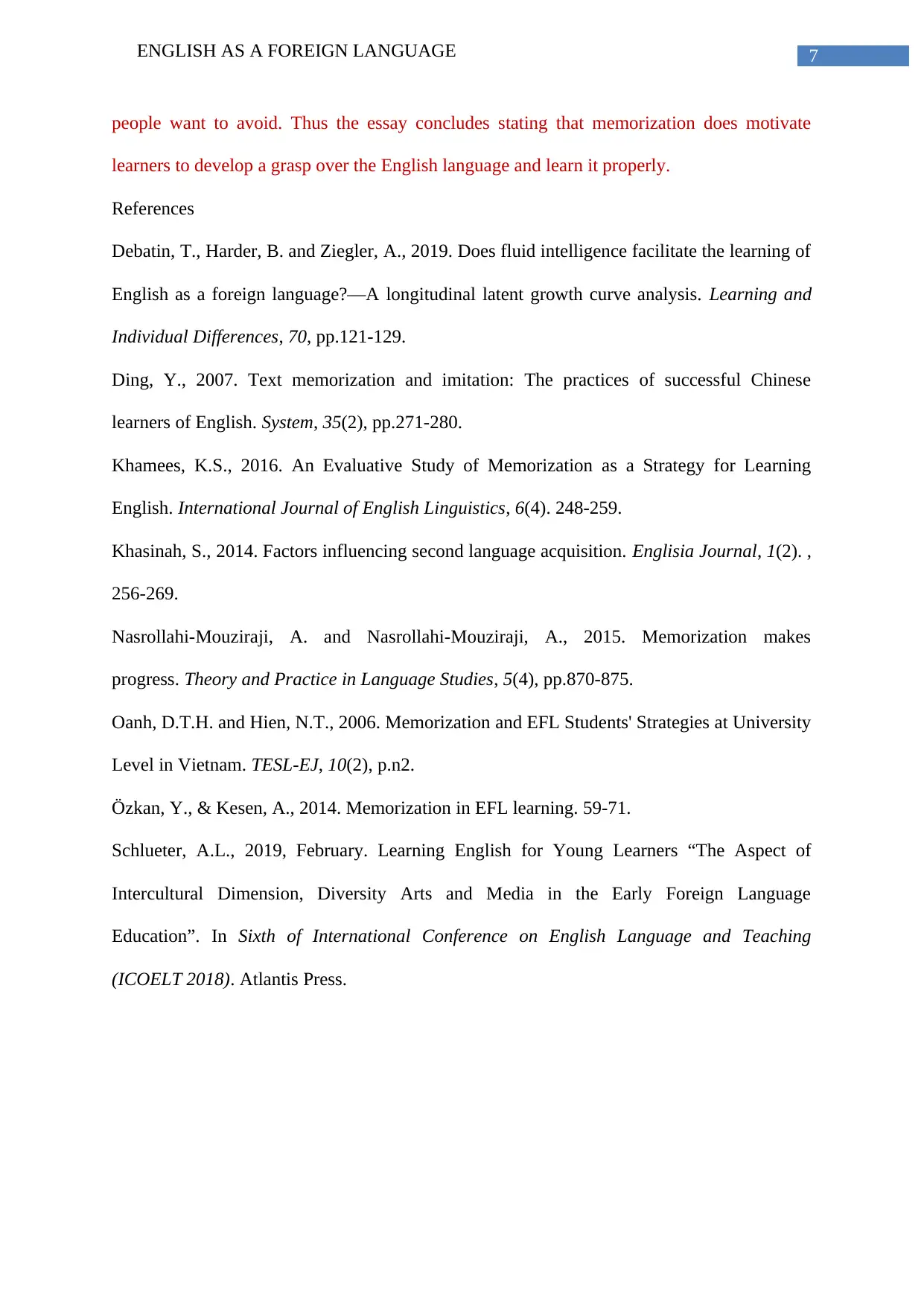
7ENGLISH AS A FOREIGN LANGUAGE
people want to avoid. Thus the essay concludes stating that memorization does motivate
learners to develop a grasp over the English language and learn it properly.
References
Debatin, T., Harder, B. and Ziegler, A., 2019. Does fluid intelligence facilitate the learning of
English as a foreign language?—A longitudinal latent growth curve analysis. Learning and
Individual Differences, 70, pp.121-129.
Ding, Y., 2007. Text memorization and imitation: The practices of successful Chinese
learners of English. System, 35(2), pp.271-280.
Khamees, K.S., 2016. An Evaluative Study of Memorization as a Strategy for Learning
English. International Journal of English Linguistics, 6(4). 248-259.
Khasinah, S., 2014. Factors influencing second language acquisition. Englisia Journal, 1(2). ,
256-269.
Nasrollahi-Mouziraji, A. and Nasrollahi-Mouziraji, A., 2015. Memorization makes
progress. Theory and Practice in Language Studies, 5(4), pp.870-875.
Oanh, D.T.H. and Hien, N.T., 2006. Memorization and EFL Students' Strategies at University
Level in Vietnam. TESL-EJ, 10(2), p.n2.
Özkan, Y., & Kesen, A., 2014. Memorization in EFL learning. 59-71.
Schlueter, A.L., 2019, February. Learning English for Young Learners “The Aspect of
Intercultural Dimension, Diversity Arts and Media in the Early Foreign Language
Education”. In Sixth of International Conference on English Language and Teaching
(ICOELT 2018). Atlantis Press.
people want to avoid. Thus the essay concludes stating that memorization does motivate
learners to develop a grasp over the English language and learn it properly.
References
Debatin, T., Harder, B. and Ziegler, A., 2019. Does fluid intelligence facilitate the learning of
English as a foreign language?—A longitudinal latent growth curve analysis. Learning and
Individual Differences, 70, pp.121-129.
Ding, Y., 2007. Text memorization and imitation: The practices of successful Chinese
learners of English. System, 35(2), pp.271-280.
Khamees, K.S., 2016. An Evaluative Study of Memorization as a Strategy for Learning
English. International Journal of English Linguistics, 6(4). 248-259.
Khasinah, S., 2014. Factors influencing second language acquisition. Englisia Journal, 1(2). ,
256-269.
Nasrollahi-Mouziraji, A. and Nasrollahi-Mouziraji, A., 2015. Memorization makes
progress. Theory and Practice in Language Studies, 5(4), pp.870-875.
Oanh, D.T.H. and Hien, N.T., 2006. Memorization and EFL Students' Strategies at University
Level in Vietnam. TESL-EJ, 10(2), p.n2.
Özkan, Y., & Kesen, A., 2014. Memorization in EFL learning. 59-71.
Schlueter, A.L., 2019, February. Learning English for Young Learners “The Aspect of
Intercultural Dimension, Diversity Arts and Media in the Early Foreign Language
Education”. In Sixth of International Conference on English Language and Teaching
(ICOELT 2018). Atlantis Press.
1 out of 8
Related Documents
Your All-in-One AI-Powered Toolkit for Academic Success.
+13062052269
info@desklib.com
Available 24*7 on WhatsApp / Email
![[object Object]](/_next/static/media/star-bottom.7253800d.svg)
Unlock your academic potential
Copyright © 2020–2026 A2Z Services. All Rights Reserved. Developed and managed by ZUCOL.





